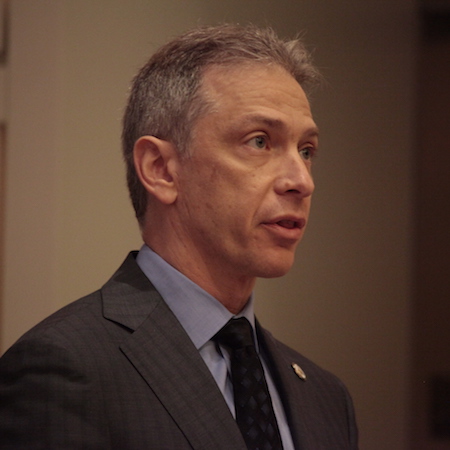PTO Proposes to Eliminate BRI at PTAB
The USPTO recently announced proposed rulemaking that would change the prior policy of using the Broadest Reasonable Interpretation (“BRI”) standard for construing unexpired and proposed amended patent claims in PTAB proceedings under the America Invents Act and instead would use the Phillips claim construction standard. The new standard proposed by the USPTO is the same as the standard applied in Article III federal courts and International Trade Commission (“ITC”) proceedings, a change critics of the PTAB process have urged for many years in order to bring uniformity to post grant challenges across forums.
“Having AIA trial proceedings use the same claim construction standard that is applied in federal district courts and ITC proceedings also addresses the concern that potential unfairness could result from using an arguably broader standard in AIA trial proceedings,” the NPRM says. “Under the proposed approach, the Office would construe patent claims and proposed claims based on the record of the IPR, PGR, or CBM proceeding, taking into account the claim language itself, specification, and prosecution history pertaining to the patent. The Office would apply the principles that the Federal Circuit articulated in Phillips and its progeny.”
USPTO issues patent eligibility guidance
 The Federal Register Notice signed by Director Iancu on April 18, 2018, which relates to the Federal Circuit’s recent decision in Berkheimer v. HP Inc., 881 F.3d 1360 (Fed. Cir. 2018), officially published on Friday, April 20, 2018. It is good news for patent owners with computer-implemented inventions and promises to bring a much more structured prosecution pathway.
The Federal Register Notice signed by Director Iancu on April 18, 2018, which relates to the Federal Circuit’s recent decision in Berkheimer v. HP Inc., 881 F.3d 1360 (Fed. Cir. 2018), officially published on Friday, April 20, 2018. It is good news for patent owners with computer-implemented inventions and promises to bring a much more structured prosecution pathway.
“The USPTO has issued today a Federal Register notice and memorandum to the patent examining corps in response to a recent decision by the U.S. Court of Appeals for the Federal Circuit in Berkheimer v. HP Inc., 881 F.3d 1360 (Fed. Cir. 2018), pertaining to subject matter eligibility,” explained Paul Fucito, a spokesman for the United States Patent and Trademark Office in the Office of Communications. “This new guidance pertains to the second step of the Alice-Mayo framework for determining subject matter eligibility, and is focused on how examiners are to analyze and document a conclusion that a claim element is ‘well-understood, routine, conventional’ during the patent examination process.”
Berkheimer is obviously an important and helpful decision from the patentee’s perspective. The Federal Register Notice appears to also be quite helpful as well. (more…)
05.10.18 | patent eligibility, USPTO | Gene Quinn
Director Iancu delivers first policy speech at U.S. Chamber of Commerce
 On April 19, 2018, the Global Intellectual Property Center (GIPC) of the United States Chamber of Commerce hosted a symposium titled Investing in American Innovation: Is the U.S. Patent Environment Promoting or Limiting Investment? The first speaker of the day, the keynote speaker, was USPTO Director Andrei Iancu, who in an important policy speech, told those gathered at the U.S. Chamber of Commerce that the U.S. patent system is at an inflection point, and that the nation cannot continue down the path we are currently on if we as a nation want to remain economically successful.
On April 19, 2018, the Global Intellectual Property Center (GIPC) of the United States Chamber of Commerce hosted a symposium titled Investing in American Innovation: Is the U.S. Patent Environment Promoting or Limiting Investment? The first speaker of the day, the keynote speaker, was USPTO Director Andrei Iancu, who in an important policy speech, told those gathered at the U.S. Chamber of Commerce that the U.S. patent system is at an inflection point, and that the nation cannot continue down the path we are currently on if we as a nation want to remain economically successful.
“We will not continue down the same path,” Iancu pledged emphatically during what can only be described as a major policy speech that gives an important look into what the new Director thinks on a variety of issues.
“The patent grant is less reliable today than it should be. This onslaught has come from all directions,” Iancu explained. “The rhetoric has focused on certain abuses instead of the incredible benefits the system brings.”
05.8.18 | Patent Issues, USPTO | Gene Quinn
Senate Confirms USPTO Director
 Andrei Iancu was confirmed by the United States Senate on February 5 to become Under Secretary of Commerce for Intellectual Property and the Director of the United States Patent and Trademark Office.
Andrei Iancu was confirmed by the United States Senate on February 5 to become Under Secretary of Commerce for Intellectual Property and the Director of the United States Patent and Trademark Office.
Joe Matal, who has been in charge at the USPTO in a quasi-Acting capacity is expected to ultimately become the next Deputy Under Secretary of Commerce for Intellectual Property and Deputy Director of the United States Patent and Trademark Office.
The Iancu vote, as expected, resulted in a unanimous confirmation. The final vote in the Senate in favor of Iancu’s nomination was 94 to 0.
02.12.18 | USPTO | Gene Quinn
PTAB denies claims of 11th Amendment sovereign immunity
 Several weeks ago, the Patent Trial and Appeal Board (PTAB) of the United States Patent and Trademark Office (USPTO) denied a motion filed by the University of Minnesota in a series of inter partes review (IPR) cases. See Order Denying Patent Owner’s Motion to Dismiss. This extraordinary denial of the motion is newsworthy because Minnesota sought a dismissal of the IPRs based on Eleventh Amendment sovereign immunity. The PTAB previously dismissed similar IPRs against state-owned patents. Here, however, the PTAB in a majority opinion authored by Chief Judge David Ruschke (pictured left), disagreed and refused to dismiss the IPRs.
Several weeks ago, the Patent Trial and Appeal Board (PTAB) of the United States Patent and Trademark Office (USPTO) denied a motion filed by the University of Minnesota in a series of inter partes review (IPR) cases. See Order Denying Patent Owner’s Motion to Dismiss. This extraordinary denial of the motion is newsworthy because Minnesota sought a dismissal of the IPRs based on Eleventh Amendment sovereign immunity. The PTAB previously dismissed similar IPRs against state-owned patents. Here, however, the PTAB in a majority opinion authored by Chief Judge David Ruschke (pictured left), disagreed and refused to dismiss the IPRs.
The PTAB ruled that the University of Minnesota “waived its Eleventh Amendment immunity by filing an action in federal court alleging infringement of the patent being challenged in this proceeding.”
01.11.18 | Inter Partes Review, Patent Issues, USPTO | Gene Quinn


No Comments
06.29.18 | USPTO | Gene Quinn